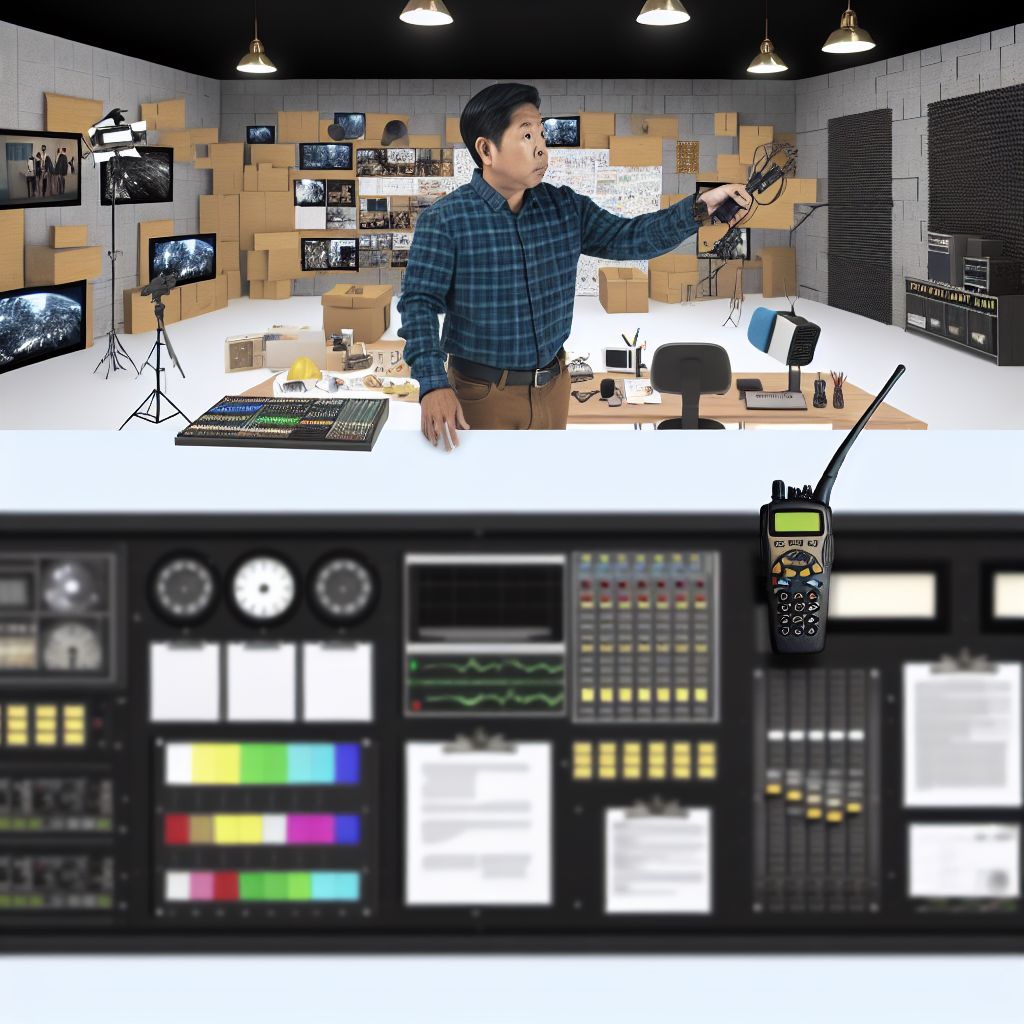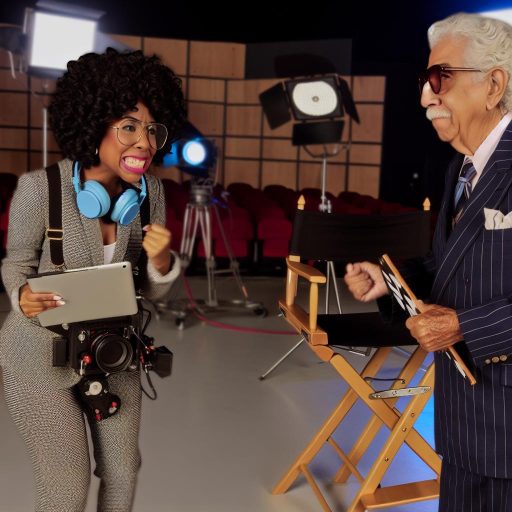A TV producer plays a crucial role in the entertainment industry.
They oversee the development, production, and execution of television shows.
Their vision helps bring ideas to life, making them integral to a show’s success.
Their duties directly influence the quality and effectiveness of a production.
A producer coordinates all aspects of a show, from budgeting to casting and scheduling.
This multifaceted role ensures that everything runs smoothly during the production process.
In this blog post, readers will explore the daily responsibilities of a successful TV producer.
We will cover key tasks, teamwork dynamics, and essential skills.
By the end, readers will gain insights into what it takes to thrive in this challenging role.
Pre-Production in Television Production
In the world of television production, pre-production plays a crucial role.
This stage lays the groundwork for a successful show.
It requires meticulous planning and coordination.
Here, we break down the essential responsibilities of a TV producer in pre-production.
Script Selection and Development
The first step in pre-production involves script selection.
Producers must choose a compelling script that aligns with the target audience.
They analyze various scripts and evaluate their market potential.
This process often involves:
- Assessing Themes: Producers examine the story’s themes, ensuring they resonate with viewers.
- Assessing Characters: Strong, relatable characters are essential for audience engagement.
- Conducting Read-Throughs: Producers organize read-throughs with selected actors to gauge script effectiveness.
Once a script is chosen, development begins.
In this phase, producers work closely with writers.
They refine dialogue, improve pacing, and enhance character development.
Transform Your Career Today
Unlock a personalized career strategy that drives real results. Get tailored advice and a roadmap designed just for you.
Start NowEffective collaboration is vital for shaping the script into a final product.
Budgeting and Financing
Budgeting is another key responsibility during pre-production.
Producers develop a detailed budget that outlines anticipated expenses.
This budget must cover a variety of areas, including:
- Personnel Costs: Salaries for cast and crew constitute significant expenses.
- Location Expenses: Fees for locations, permits, and logistics can add up quickly.
- Production Costs: Equipment rental, set construction, and materials fall under this category.
- Marketing Budget: Producers allocate funds for promoting the show after production concludes.
Aligning the budget with audience expectations is essential.
Producers must estimate how much viewers will be willing to pay for content.
They often collaborate with financiers to secure funding for the project.
Assembling the Project Team
Producers play a vital role in assembling a talented project team.
Hiring the right personnel is crucial for a successful production.
They oversee the hiring process for various roles, including:
- Writers: Skilled writers craft engaging scripts that capture the audience’s imagination.
- Directors: Visionary directors bring the script to life, shaping the overall aesthetic.
- Cinematographers: They handle the visual aspects, ensuring high-quality footage.
- Production Designers: These experts design sets that elevate the narrative.
- Editors: Editors piece together the footage, creating a seamless final product.
During this process, producers assess candidates based on experience and vision.
They conduct interviews to gauge compatibility and creativity.
A cohesive team enhances workflow and fosters collaboration.
Project Timeline Development
Another critical aspect of pre-production is developing a project timeline.
Producers create a detailed schedule that outlines each production phase.
This timeline helps keep everyone on track and ensures deadlines are met.
Key components of the timeline include:
- Script Finalization: Setting deadlines for script revisions allows for ample preparation time.
- Pre-Production Meetings: Regular meetings keep the team informed and aligned with project goals.
- Auditions: Scheduling auditions helps identify the perfect cast for the story.
- Rehearsals: Allocating time for rehearsals ensures actors are well-prepared.
Producers use this timeline to monitor progress.
They adjust the schedule as necessary to accommodate unexpected delays.
Showcase Your Business Today
Reach thousands of readers actively exploring professional services. Publish your business profile and grow your audience now.
Publish NowFlexibility is crucial, as it facilitates problem-solving during production.
Securing Locations and Permissions
A successful producer must also secure filming locations.
They scout for venues that fit the script’s requirements.
The chosen locations should enhance the storytelling and reflect the production’s tone.
Producers navigate logistics by:
- Conducting Location Scouts: These visits help identify suitable venues.
- Obtaining Permits: Producers secure necessary permits to shoot in public spaces.
- Negotiating Contracts: They negotiate terms with property owners to finalize agreements.
By securing the right locations, producers ensure authenticity while minimizing disruptions during filming.
Finalizing Production Details
As pre-production wraps up, producers finalize all production details.
They confirm the cast, crew, and locations.
This stage also involves arranging logistics for the shoot, including:
- Scheduling Transportation: Producers coordinate transport for the cast and crew.
- Organizing Catering: Providing meals to maintain morale during long shooting hours is essential.
- Setting Up Equipment: Producers ensure all technical equipment is ready for use.
Effective communication among team members is critical during this phase.
Producers facilitate open lines of communication to minimize misunderstandings.
Understanding Project Management in TV Production
Project management in television production involves planning, executing, and finalizing projects according to specific deadlines and budgets.
Producers oversee multiple aspects of production, from pre-production planning to post-production editing.
They become the strategic leaders who align creative vision with logistical execution.
Each step requires meticulous organization and person-centered leadership.
How does project management manifest in the daily tasks of a producer? Here’s a breakdown:
- Planning: Producers initiate projects by defining objectives, estimating timelines, and allocating resources.
- Execution: They coordinate with various teams to bring ideas to life while identifying potential obstacles.
- Monitoring: Producers continuously track progress, adjusting plans as required to keep production on schedule.
- Closure: Once a project is complete, producers ensure all elements are formally wrapped up, completing financial and administrative tasks.
Task Prioritization and Deadline Management
Successful producers excel in prioritizing tasks and setting realistic deadlines.
They rely on their comprehensive understanding of the production process.
Producers assess which tasks most critically impact project success and focus on these first.
This methodology ensures that necessary groundwork is completed before moving to secondary tasks.
Here are key strategies they use:
- Creating a Production Schedule: Producers design detailed schedules that outline every phase of production. These timelines break down tasks into manageable segments.
- Using Project Management Tools: Many producers adopt software tools to help visualize timelines, assign tasks, and monitor progress. This technology fosters transparency and accountability.
- Establishing Priority Levels: Not all tasks are of equal importance. Producers evaluate deadlines based on urgency and relevance to the overall project.
- Defining Milestones: Setting key milestones gives producers touchpoints to assess progress and make necessary adjustments moving forward.
Meeting deadlines remains critical in television production.
Timely completion influences numerous downstream processes, from editing to marketing.
Producers frequently communicate with various departments to maintain accountability and align priorities throughout all phases.
Communication Across Departments
Effective communication stands at the heart of a producer’s project management skills.
Producers serve as the central hub of information.
Regular communication flows between departments such as casting, location management, and set design.
Here’s how communication manifests in day-to-day operations:
- Regular Meetings: Producers schedule frequent check-ins with team leads to review ongoing tasks and address concerns promptly.
- Clear Guidelines: Setting clear expectations for different teams minimizes confusion and promotes task efficiency.
- Feedback Loops: Producers encourage feedback from all departments, adapting strategies to address issues that arise in real time.
- Documentation: Keeping detailed records of communications and decisions helps maintain clarity and accountability across teams.
Collaboration with the casting department ensures the right talent is secured, matching characters with performers effectively.
Producers assess auditions and negotiate contracts, ensuring compliance with budgetary constraints.
Cooperation with location managers is another crucial area.
Producers work closely with them to scout and secure filming locations that align with the creative vision while respecting logistical requirements.
They discuss permits, regulations, and any necessary accommodations or adjustments.
Set design collaboration enhances the visual storytelling aspect of production.
Producers communicate closely with set designers to ensure that environments align with both budgetary limits and artistic goals.
Regular updates allow for adjustments to be made quickly when issues arise.
Adaptability and Problem-Solving
A hallmark of successful project management lies in adaptability.
TV production is inherently unpredictable, with unforeseen problems often cropping up.
Whether it’s an unexpected actor withdrawal or inclement weather, producers must pivot swiftly to find solutions.
Here’s how seasoned producers manage these challenges:
Showcase Your Business Today
Reach thousands of readers actively exploring professional services. Publish your business profile and grow your audience now.
Publish Now- Developing Contingency Plans: Producers preemptively create backup plans to mitigate potential risks and ensure project continuity.
- Encouraging Creative Problem Solving: Team members are empowered to propose alternative solutions during challenges, often leading to innovative approaches.
- Maintaining a Positive Atmosphere: Managing stress within the team is vital. Producers foster a collaborative environment that encourages open communication and resource-sharing.
A successful TV producer remains vigilant, organized, and communicative.
Mastering project management skills is fundamental for navigating the complexities of television production.
Through a mix of foresight, adaptability, and leadership, producers transform creative ideas into polished television productions.
They remain committed to delivering quality content while managing multiple moving parts.
Ultimately, project management forms the backbone of a producer’s day-to-day responsibilities, defining their path to success.
Learn More: Building Strong Client Relationships as an Art Director
Casting Process
A successful television producer plays a pivotal role in the casting process.
Their involvement significantly impacts the show’s overall quality and success.
A producer must select actors who not only fit their roles but also align with the show’s vision.
Below, we explore the essential aspects of the casting process.
Producer’s Involvement in Casting
The casting process starts with the producer’s vision for the project.
They consider the characteristics required for each role and develop specific casting criteria.
This vision shapes the kind of talent needed to bring the story to life.
Producers often review casting breakdowns and attend auditions.
They assess how actors fit into the characters’ arcs and the ensemble as a whole.
Their decisions are crucial in maintaining the artistic integrity of the production.
In addition, producers frequently meet with casting directors to discuss the project.
These meetings help align the producer’s vision with the director’s ideas and understand the casting landscape.
Effective communication ensures that the casting process runs smoothly.
Collaboration with Casting Directors
A producer collaborates closely with casting directors to select the best candidates for each role.
Casting directors typically present a list of potential actors based on the producer’s criteria.
This collaboration requires trust and open communication.
Producers participate in casting sessions to evaluate performances directly.
They provide feedback to casting directors, refining the list of actors to audition.
This teamwork allows them to tap into the expertise of casting directors while also asserting their creative control.
Auditioning is an essential part of the casting process.
Producers may shape the parameters of the auditions by defining what they want to see.
They ensure that each actor feels relaxed and able to showcase their talent effectively.
Conducting Auditions
During auditions, the producer observes the actors’ performances.
They analyze the actors’ interpretations of the script and assess their chemistry with other performers.
This analysis is critical for ensuring that the cast works well together.
Producers often request callbacks for actors who make a strong impression.
Callbacks provide an opportunity to see the actors in different scenes.
This allows producers to gauge their versatility and fit even further.
Once auditions conclude, producers evaluate each actor’s potential impact on the show.
They consider factors such as talent, presence, and marketability.
Producers must always keep the show’s audience in mind.
Impact of Casting Choices
The casting choices made by producers dramatically affect the success of a show.
The right casting can elevate a project, improving audience engagement and viewership.
Audiences connect with characters, so a skilled actor can make or break that connection.
Showcase Your Business Today
Reach thousands of readers actively exploring professional services. Publish your business profile and grow your audience now.
Publish NowThere are several factors that determine the impact of casting choices:
-
Character Authenticity: The actor must embody the character’s traits convincingly.
-
Star Power: Well-known actors can attract viewership, boosting ratings.
-
Chemistry: Cast members must work well together on screen.
-
Diversity: A diverse cast can resonate with broader audiences.
-
Audience Expectations: Producers must consider what viewers expect.
Producers must weigh each of these factors carefully.
The casting process is not merely about finding talent; it is about selecting actors who create authentic connections with viewers.
Furthermore, producers often make casting choices based on potential for character development.
They sometimes look for actors who can grow with their roles over time.
This foresight can enhance storytelling opportunities for future seasons.
Defining the Essence of Casting
The casting process stands as a fundamental duty of a television producer.
Their involvement influences every aspect of casting, from selecting artists to conducting auditions and assessing performances.
Successful casting requires collaboration, careful evaluation, and an understanding of the audience.
Ultimately, a producer’s decisions shape not only the show’s narrative but also its commercial success.
Through strategic casting, producers help create memorable and impactful television for audiences worldwide.
See Related Content: Media Planner Salary: What to Expect
Production Phase Duties
The production phase is a whirlwind for any TV producer.
Each day brings new challenges and tasks that require a keen eye and quick decision-making.
During filming, the producer’s involvement is crucial to ensure a smooth workflow.
Day-to-Day Involvement
Producers maintain constant oversight during the filming of a show.
They actively manage a variety of tasks, ensuring all elements align with the overall vision.
- Daily Briefings: Every morning, they hold briefings with the crew.
- Monitoring Progress: Throughout the day, producers check on various departments.
- Adjusting Plans: When unforeseen issues arise, producers quickly adapt plans.
- Acting as a Liaison: Producers serve as the point of contact.
- Maintaining the Vision: Producers ensure the creative vision is upheld.
Overseeing the Schedule
Producers are critical in overseeing the production schedule.
They develop a shooting schedule that maximizes efficiency.
- Creating Timelines: At the beginning of the production, producers create detailed timelines.
- Daily Adjustments: They assess the daily shooting schedule and make necessary adjustments.
- Tracking Shot Counts: Producers keep track of shot counts and filming progress.
- Meeting Deadlines: They strictly monitor progress to meet overall project deadlines.
- Communicating Changes: If adjustments to the shooting schedule occur, producers communicate these changes promptly.
Managing Staff
Effective staff management is another key responsibility.
Producers oversee various departments and ensure smooth operations.
- Assigning Roles: Producers make sure everyone knows their roles and responsibilities.
- Hiring Crew: When necessary, producers hire additional staff.
- Facilitating Communication: Producers foster open communication among team members.
- Conducting Meetings: Regular meetings are essential for alignment.
- Handling Conflicts: Conflicts may arise among crew members, and producers intervene.
Ensuring Adherence to the Budget
Producers play a vital role in budget management during filming.
They ensure that all departments operate within financial constraints.
- Monitoring Expenses: Producers track expenses daily to avoid budget overruns.
- Making Cost-effective Decisions: When unexpected costs arise, producers make quick decisions.
- Communicating Financial Constraints: Producers ensure that department heads understand budget limits.
- Preparing Budget Reports: Weekly budget reports allow producers to review spending patterns.
- Securing Additional Funding: If necessary, producers explore options for additional funding.
Conflict Resolution
Conflict resolution is a daily necessity on set.
Disputes can arise due to stress, time constraints, or creative differences.
- Identifying Issues: Producers actively observe team dynamics, watching for signs of conflict.
- Listening to All Parties: When conflicts occur, producers take time to listen.
- Facilitating Discussions: Producers mediate discussions between conflicting parties.
- Implementing Solutions: After gathering insights, producers implement effective solutions.
- Promoting a Positive Environment: By fostering a culture of respect, producers minimize future conflicts.
Decision-Making on Set
Producers face countless decisions daily.
Their ability to make quick yet informed choices significantly impacts production quality.
- Evaluating Options: Producers assess different options critically.
- Seeking Input: Involving other team members in decision-making can yield new ideas.
- Staying Aligned with the Vision: Every decision reflects the show’s creative vision.
- Taking Responsibility: Ultimately, producers own their decisions.
- Reflecting on Past Experiences: Producers draw from their past experiences when making decisions.
Delve into the Subject: Corporate Trainer Advice for Communication Skill Assessment
Post-Production Oversight
The post-production phase is crucial for the success of any television project.
A producer’s role during this phase is multifaceted and integral.
They ensure the vision crafted during pre-production and filming is effectively translated into the final product.
Below, we explore the steps and responsibilities of producers during the editing and post-production phases.
The Producer’s Role in Editing
In the editing suite, the producer collaborates closely with editors.
This partnership is essential for shaping the narrative and pacing.
The producer helps determine how scenes are cut and assembled.
Below are key responsibilities of producers during editing:
- Reviewing rough cuts of the show to provide insights.
- Offering feedback on pacing and emotional beats.
- Ensuring storylines are cohesive and logical.
- Prioritizing scenes based on overarching themes.
- Maintaining communication regarding budget constraints.
The editing process can be intensive. Producers must be available to make quick decisions that can impact the final cut.
This ability to navigate editing aids in refining the show’s vision and message.
Collaboration with Sound Engineers
Once editing progresses, sound design becomes a focal point for producers.
The sound enhances the visual narrative and deepens audience engagement.
Showcase Your Business Today
Reach thousands of readers actively exploring professional services. Publish your business profile and grow your audience now.
Publish NowWorking with sound engineers involves several tasks:
- Overseeing the selection of background scores and sound effects.
- Approving audio mix levels to ensure clarity.
- Collaborating on voiceovers and dialogue adjustments.
- Ensuring sound quality aligns with the production’s tone.
- Addressing any discrepancies between sound and visuals.
Producers drive the conversation with audio professionals to make certain that the sound design complements the overall vision.
They understand the power of audio to evoke emotions and create atmosphere.
Integrating Visual Effects
In today’s landscape, visual effects (VFX) are integral to many productions.
A producer’s involvement in this area can dictate a show’s visual integrity.
Key activities include:
- Evaluating VFX requirements during pre-production.
- Reviewing VFX drafts to ensure authenticity.
- Coordinating between visual effects teams and directors.
- Ensuring that VFX timelines align with budget constraints.
- Confirming that VFX meshes seamlessly with the footage.
The producer’s eye for detail ensures that any visual effects enhance rather than distract from the story.
They must align the VFX work with the script’s initial vision.
Quality Control and Final Product Alignment
Quality control is a significant aspect of post-production oversight.
Producers instill the importance of maintaining high standards in every scene.
Tasks they undertake include:
- Conducting screenings to assess the project’s impact.
- Collecting feedback from test audiences or focus groups.
- Prioritizing adjustments that enhance narrative clarity.
- Confirming that the pacing resonates with viewers.
- Checking continuity and visual consistency throughout episodes.
Producers must safeguard the project’s quality against deadlines and budget limitations.





